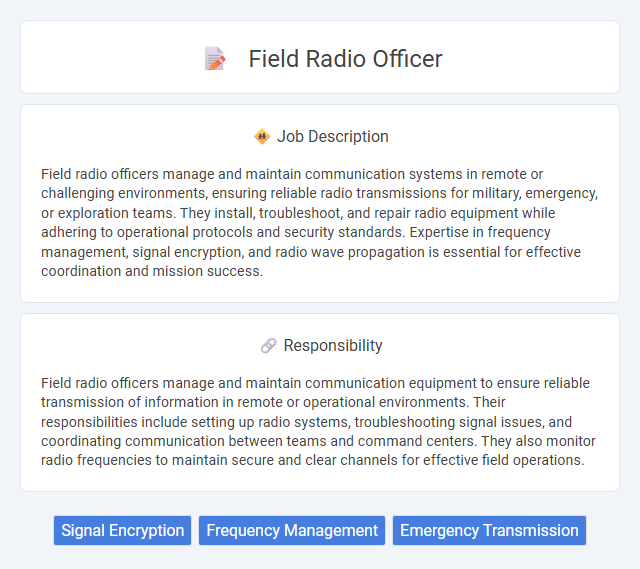
Field radio officers manage and maintain communication systems in remote or challenging environments, ensuring reliable radio transmissions for military, emergency, or exploration teams. They install, troubleshoot, and repair radio equipment while adhering to operational protocols and security standards. Expertise in frequency management, signal encryption, and radio wave propagation is essential for effective coordination and mission success.
Individuals who thrive as field radio officers are likely to possess strong communication skills, adaptability, and the ability to work under pressure in challenging environments. Those comfortable with technical equipment and quick decision-making may find this role suitable, as it often demands precise coordination and problem-solving in dynamic, sometimes unstable, conditions. Candidates who prefer structured, predictable settings may have difficulty adjusting to the unpredictable nature of field operations.
Qualification
Field radio officers must possess strong knowledge of radio communication systems, including VHF, UHF, and HF radios, alongside a solid understanding of signal protocols. Essential qualifications include certifications in radio operation and maintenance, such as the FCC General Radiotelephone Operator License or equivalent, and experience with encryption devices and emergency communication procedures. Proficiency in troubleshooting technical issues and strong analytical skills are critical to ensuring reliable and secure communication in dynamic field environments.
Responsibility
Field radio officers manage and maintain communication equipment to ensure reliable transmission of information in remote or operational environments. Their responsibilities include setting up radio systems, troubleshooting signal issues, and coordinating communication between teams and command centers. They also monitor radio frequencies to maintain secure and clear channels for effective field operations.
Benefit
Field radio officer roles likely offer significant benefits such as gaining expertise in advanced communication technologies and protocols, which may enhance career prospects. The job often provides opportunities to develop problem-solving skills under pressure, potentially increasing professional resilience and adaptability. Working in diverse environments might contribute to cultural competence and teamwork abilities, improving overall employability in military and civilian sectors.
Challenge
Field radio officer roles likely present significant challenges related to maintaining reliable communication under adverse conditions. The probability of encountering technical malfunctions and signal disruptions in remote or hostile environments is high. These challenges demand quick problem-solving skills and adaptability to ensure uninterrupted operational support.
Career Advancement
Field radio officer positions offer significant career advancement opportunities through specialized communication training and leadership roles in military and emergency response units. Proficiency in radio technology and tactical communication can lead to promotions to senior communication specialists or coordination officers. Continuous skill development in secure transmissions and electronic warfare enhances prospects for higher-ranking technical and strategic positions.
Key Terms
Signal Encryption
A Field Radio Officer specializes in managing secure communication channels through advanced signal encryption technologies to prevent interception by unauthorized parties. They implement cryptographic protocols and continuously update encryption keys to maintain the integrity and confidentiality of transmitted data in tactical environments. Proficiency in frequency hopping, encryption algorithms, and signal decryption tools is essential for safeguarding mission-critical information during operations.
Frequency Management
Field radio officers specialize in frequency management to ensure clear, secure communication channels during operations. They coordinate frequency allocation, monitor signal interference, and optimize radio spectrum usage to maintain uninterrupted connectivity. Expertise in radio frequency regulations and real-time troubleshooting is critical to support mission-critical communications.
Emergency Transmission
Field radio officers specialize in emergency transmission, ensuring reliable communication during critical situations such as natural disasters or military operations. They operate and maintain radio equipment, troubleshoot signal disruptions, and coordinate with emergency response teams to deliver clear, timely messages. Expertise in frequency management and encryption protocols is essential for secure, uninterrupted emergency broadcasts.
 kuljobs.com
kuljobs.com